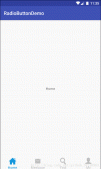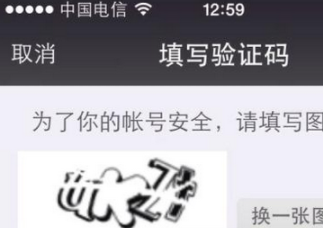在登陸一些頁面時(shí),通常能看見“一閃而過”效果并進(jìn)入頁面。下面看看是怎樣實(shí)現(xiàn)這樣的效果的吧
首先,在布局里(可以說和平常沒有什么不同),劃線部分是進(jìn)度條:
|
1
2
3
4
5
6
7
8
9
10
11
12
13
14
15
16
17
18
19
20
21
22
23
24
25
26
27
28
29
30
31
32
33
34
35
|
<RelativeLayout xmlns:android="http://schemas.android.com/apk/res/android" xmlns:tools="http://schemas.android.com/tools" android:layout_width="match_parent" android:layout_height="match_parent" android:background="@drawable/bg" > <ImageView android:id="@+id/welcome" android:layout_width="wrap_content" android:layout_height="wrap_content" android:layout_centerHorizontal="true" android:layout_marginBottom="45dp" android:src="@drawable/welcome" /> <ProgressBar android:id="@+id/progressBar" android:layout_width="wrap_content" android:layout_height="wrap_content" android:layout_below="@+id/welcome" android:layout_centerHorizontal="true" android:layout_marginBottom="70dp" /> <TextView android:id="@+id/textView1" android:layout_width="wrap_content" android:layout_height="wrap_content" android:layout_below="@+id/progressBar" android:layout_centerHorizontal="true" android:padding="@dimen/padding_medium" android:text="@string/welcome" android:textAppearance="?android:attr/textAppearanceMedium" tools:context=".MainActivity" /> </RelativeLayout> |
在String中定義:
|
1
2
3
4
5
6
7
8
9
10
11
12
13
14
|
<resources> <string name="app_name">ShanP01</string> <string name="welcome">歡迎加入!\n一起快樂學(xué)習(xí)!</string>//(\n)實(shí)現(xiàn)換行 <string name="menu_settings">Settings</string> <string name="title_activity_main">MainActivity</string> <string name="title_study">學(xué)習(xí)</string> <string name="title_search">搜查</string> <string name="title_game">游戲</string> <string name="title_save">保存</string> <string name="title_help">幫助</string> <string name="title_activity_welcome">WelcomeActivity</string> </resources> |
如果想在運(yùn)行項(xiàng)目時(shí)不顯示標(biāo)題欄,則在想隱藏標(biāo)題欄的Activity中加一句即可(在AndroidManifest.xml文件中):
|
1
|
android:theme="@android:style/Theme.NoTitleBar" |
最主要的實(shí)現(xiàn)方法:
|
1
2
3
4
5
6
7
8
9
10
11
12
13
14
15
16
17
18
19
20
21
22
23
24
25
26
27
28
29
30
31
32
33
34
35
36
37
38
39
40
41
42
|
public class WelcomeActivity extends Activity { private ImageView welcomeImage; @Override public void onCreate(Bundle savedInstanceState) { super.onCreate(savedInstanceState); setContentView(R.layout.activity_welcome); welcomeImage=(ImageView) this.findViewById(R.id.welcome); AlphaAnimation alphaAnimation=new AlphaAnimation(0.1f, 1.0f);////定義一個(gè)具有淡入效果的對(duì)象 alphaAnimation.setDuration(3000);//定義閃屏?xí)r間(毫秒) welcomeImage.startAnimation(alphaAnimation); alphaAnimation.setAnimationListener(new AnimationListener() { @Override public void onAnimationStart(Animation animation) { } @Override public void onAnimationRepeat(Animation animation) { } @Override public void onAnimationEnd(Animation animation) { Intent intent=new Intent(); intent.setClass(WelcomeActivity.this, MainActivity.class);//定義閃屏效果從哪一界面跳到哪一頁面 startActivity(intent); finish(); } }); } @Override public boolean onCreateOptionsMenu(Menu menu) { getMenuInflater().inflate(R.menu.activity_welcome, menu); return true; } } |
其實(shí)閃屏效果不止這一種,但這是我認(rèn)為簡便的一種。還有一種:
|
1
2
3
4
5
6
7
8
9
10
11
12
13
14
15
16
|
public void onCreate(Bundle savedInstanceState) { super.onCreate(savedInstanceState); setContentView(R.layout.activity_welcome); welcomeImage=(ImageView) this.findViewById(R.id.welcome); AlphaAnimation alphaAnimation=new AlphaAnimation(0.1f,1.0f);////定義1個(gè)具有淡入效果的對(duì)象 welcomeImage.startAnimation(alphaAnimation); new Handler().postDelayed(new Runnable() { @Override public void run() { Intent intent=new Intent(); intent.setClass(WelcomeActivity.this, MainActivity.class); startActivity(intent); finish(); } },3000);//細(xì)心不要漏了 } |
你覺得哪一種更適合你呢?
以上就是本文的全部內(nèi)容,希望對(duì)大家的學(xué)習(xí)有所幫助,也希望大家多多支持服務(wù)器之家。
原文鏈接:https://blog.csdn.net/duyuping/article/details/8221437














